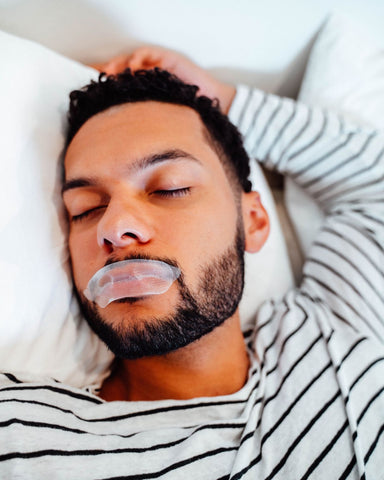If you aren’t sleeping enough during the week, you might think you can just “catch up” as soon as the weekend hits.
Truth is, just like any debt, sleep debt adds up quickly.
Say you need eight hours of sleep per night but in actuality, you only got six hours each night from Monday through Friday. Your sleep deficit for the week is a whopping 10 hours, which you can’t fix in just one weekend!
Moreover, this throws off your circadian rhythm and increases inflammation across the body and brain, dramatically increasing your risk for illness and disease.

If you want to reduce brain inflammation, you have to correct your sleep patterns for the long haul.
Before we dive into the details of the link between sleep deprivation and inflammation, let’s first cover what inflammation is, exactly.
What is Inflammation, Exactly?
Chances are that you’ve heard the term “inflammation” thrown around, but it’s more than a trendy buzzword.
Inflammation refers to your body’s response to foreign objects that it needs to get rid of like bacteria or damaged cells.
Inflammation helps to remove these pathogens, but chronic inflammation can be painful and uncomfortable.
For example, swelling due to an infection is an ongoing issue that needs to be addressed, as the body is unable to complete the healing process.
Ongoing inflammation leads to chronic pain and stresses every system within the body.
Furthermore, inflammation is sometimes caused by the immune system fighting against itself in cases such as rheumatoid arthritis or Crohn’s disease.
Chronic inflammation can last for years – and a lack of sleep is directly tied to it.
Lack of Sleep Increases Inflammation
A recent study examined 525 middle-aged participants who had completed the Pittsburgh Sleep Quality Index (PSQI) questionnaire.
The PQSI questionnaire included questions about sleep quality and sleep duration, giving insights into how many participants got less than six hours of sleep per night, between six and nine hours per night, and nine hours of sleep or more.

Researchers then studied and compared participants’ levels of three different inflammatory markers: fibrinogen, Interleukin-6 (IL-6), and C-reactive protein.
Fibrinogen is a blood plasma protein produced in the liver that helps form normal clots in the blood. High levels indicate inflammation and a risk of forming clots that could harm the heart and brain.
IL-6 is produced at the site of inflammation. High levels are also linked to fatigue, pain, and depression in those with rheumatoid arthritis.
Finally, C-reactive protein, a popularly studied marker for inflammation, is tied to an increased risk for heart disease. High levels typically indicate a serious infection, injury, or chronic disease.
Researchers found that participants with poor sleep levels had significantly higher levels of all three inflammatory markers when compared to participants with good sleep quality.
One theory about how a lack of sleep contributes to inflammation centers around our blood vessels and how blood pressure drops during sleep.

As we rest and blood pressure decreases, blood vessels relax. If sleep is restricted or you aren’t getting enough quality sleep, blood pressure can’t drop as it usually would.
This triggers cells within the blood vessel walls to activate an inflammatory response and place the body in a stressed state.
It’s no surprise, then, that a lack of sleep also contributes to poor immune function.
Sick and Tired (Literally)
If you’re sick and tired of feeling sick and tired, correcting your dysfunctional sleep patterns may have a bigger impact than you think.
Studies show that people who are sleep deprived are more likely to experience illness after being exposed to a virus than those who are well-rested.
Moreover, people who are low on sleep don’t recover as quickly as others if they do happen to get sick.

This all ties back to proteins called cytokines, which your immune system releases during sleep.
Some cytokines rise during periods of infection or stress. If you’re sleep-deprived, cytokine production doesn’t function as it should.
As cytokine production slows due to a lack of restorative sleep, the body makes fewer antibodies and virus-fighting cells.
In conclusion, you need adequate sleep to fight disease. This brings us to our next point: short sleep duration may even take years off of your life.
Short Sleep Duration, Shorter Life Span
Sleeping for the recommended seven to eight hours is proven to help you live longer.
Conversely, sleeping less than recommended is linked to a shorter life span. Sleep deprivation causes high blood pressure, obesity, diabetes, and more.
Each of these ailments is associated with cardiovascular disease and stroke.
When it comes to brain inflammation, sleep is like a street sweeper for the mind. When this system is interrupted due to a lack of sleep, the build-up can turn deadly.

Our brains have a housekeeping system called the glymphatic system. During the deepest phases of sleep, cerebrospinal fluid flows through the brain and sweeps away proteins linked to cell damage.
Without a good night’s sleep, less of this fluid is swept through the brain to “clean out the pipes,” so to speak.
As a result, protein accumulates and inflammation rises. However, this build-up of protein causes a cycle that’s difficult to break – the buildup impairs non-REM sleep.
Non-REM, slow-wave sleep is vital for helping us heal, recover, deal with stress, and problem-solve.
As non-REM sleep decreases due to protein build-up, even more protein is added little by little as the glymphatic system slows.
This protein build-up decreases the structural integrity of the brain, decreasing its size. The ability and function of the thalamus and hippocampus slows, leading to Alzheimer’s disease.
@somnifix Sleep deprivation is linked to brain #inflammation & a build up of b-amyloid #protein known to cause #alzheimersdisease 🧠 #dementia #alzheimersprevention #brainhealth ♬ Fallen down - Slowed - 「Incørrect」
While this typically becomes an issue after long-term sleep deprivation, even one night of interrupted sleep elevates protein buildup in the brain to higher levels than normal.
It’s no secret, then, that the best way to reduce brain inflammation is to correct poor sleep habits with a structured, sustainable sleep routine.
Reduce Brain Inflammation With Healthy Sleep Habits
It’s a proven fact that some people just have a harder time sleeping than others.
While part of this is caused by genetic predisposition, most of our sleep patterns have to do with our circadian rhythm. By resetting our sleep-wake patterns, we can bring balance back to this rhythm.
One of the easiest ways to reset your circadian rhythm is to expose yourself to sunlight in the morning and avoid blue light sources in the evening.

That includes blue light from electronics, which you should avoid at least two hours before bed.
Blue light tricks your body into thinking it’s still daytime, preventing the release of sleep-inducing melatonin.
Moreover, cut out any sleep disruptions like a loud radio or snoring, which is proven to fragment our sleep and harm our health.
Although snoring is harmful, many of us do it. One in four adults snores, in fact. So how do you stop it? Mouth tape!

Mouth breathing causes snoring by forcing the tissues in our airway to fall backward and vibrate together. We also weren’t meant to breathe through our mouths outside of emergencies, such as allergies or illness.
We were designed to nasal breathe instead, as the nose filters and humidifies the air, helping us oxygenate our blood with ease.
The easiest way to nasal breathe at night and prevent sleep-disrupting snoring is to keep the mouth closed while you sleep.

SomniFix Mouth Strips are gentle, non-irritating, and feature a comfortable, gel-like adhesive that’s sure to help you drift off peacefully, snore-free.
Reduce brain inflammation, improve sleep quality, and cut back on sleep disruptions by adding SomniFix to your sleep routine tonight!



